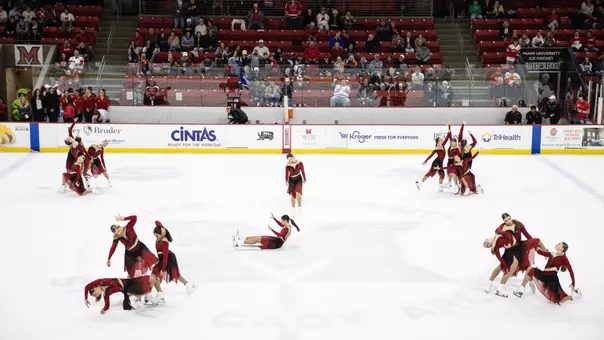Miami Ohio University Athletics
Skater Exhibits Grace, Toughness On Ice
12/17/2001 12:00:00 AM | Synchronized Skating
Dec. 17, 2001
A busted head, broken toe, broken thumb, gauged shin and broken nose sound like the injuries of a football or lacrosse player. In the case of Miami senior Meghan Schenker, these are the injuries she has incurred over her four-year career as a synchronized skater. Before she found success, and some injuries, Schenker began her skating career in sunny Orlando, Fla.
"There are actually four rinks around the Orlando area and several around Tampa Bay, I've trained in all of them," Schenker says. "I started skating at the public session, learn-to-skate, the kind of thing to get kids interested about skating, and that's what happened to me. It took a lot of commitment especially when I became a competitive skater and had to wake up in the wee hours of the morning before school."
After graduating from Lake Highland Preparatory with high honors, Schenker chose to head north to attend Miami University and continue her skating career under the tutelage of RedHawk synchronized skating coach Vicki Korn.
"I really wanted to continue my skating at college and my coaches at home knew that I was into the competitive skating," Schenker says. "I just tried to get my levels up, decided to try out for the team and now I'm here."
In her first season at Miami, Schenker immediately made her presence felt on the varsity (now senior) synchronized skating team by being named the team's most improved skater. Schenker and the RedHawks made history when they won the U.S. National Championship in 1998-99, the first such title in program history. Since then Schenker has seen the team finish third in 1999-00, second in 2000-01, and win its first international competition at the Prague Cup in the Czech Republic.
Despite all of the team's accomplishments and medals, synchronized skating remains a misunderstood sport on the Miami campus. Schenker, who also is an accomplished individual skater, having attained the Gold Level in dance and moves in the field, says the sport grows on an individual.
"You grow to appreciate synchro the more you skate it," Schenker says. "In order to do this sport, you need to make a huge mental commitment to trust your teammates and to trust yourself. Your commitment to the skating depends on how you prioritize what is important in your life. If you've got to skate the next day, you can't go out. As a student-athlete, you have to maintain your grade-point average because if you don't, you won't be able to skate. I am very careful at maintaining that balance."
Most student-athletes only have enough time in the day for their schooling, and going to practice. This is not at all the agenda that Schenker keeps in her daily planner. All it takes is a short conversation with Schenker to realize that she is a very goal-oriented individual and has both feet firmly planted on the ground.
"I'm going into education advocacy, and my plan is to go to law school," Schenker says. "I'm actually not graduating at the end of this year because I still have a couple more hours to finish and have to do the student-teaching thing. At the end of all that, I would like to go to law school."
In addition to maintaining a strong GPA, Schenker also is actively involved in her sorority, Alpha Gamma Delta. Her list of activities doesn't end there as she also participates in community service at Miami.
"I'm a philanthropy chair for Alpha Gamma Delta and made it into the Order of Omega, higher groups," Schenker says. "I am also a member of the Council for Exceptional Children."
Despite all of her activities, Schenker speaks most proudly of the synchronized skating team and its accomplishments. Last season the team placed second at the U.S. National Championships and ninth overall in the world. She and her classmates would like to improve on those finishes this season and have taken the necessary steps to achieve those goals.
"We have to do off-ice things with the team?watch videos, have meetings?and there are times when we need to have single sessions with the coaches," says Schenker. "For all intensive purposes, we live here (Goggin). If there were an upstairs in the Goggin, I'd have a bed there."
One of the reasons for the synchronized skating team's success over the past years is individuals like Schenker. Schenker knows what it takes to be a good synchronized skating team. She knows that believing in her teammates is the team's first hurdle.
"Trust is so important. There are a lot of positions you get in: a block, in circles, situations where blades are obviously around you, and it can get ridiculous," Schenker says. "Someone was in front of me and we weren't going the same speed, so I tripped over her feet. The person that was behind me ran into me and my head hit the ice."
While explaining how important it is to trust her teammates, Schenker also illustrates the difficulty level of synchronized skating and the dangers that exist. Her list of injuries may be large in number for the average synchronized skater, but as her coach isn't at all shy to point out that they are a testament to her toughness.
"Synchronized skating is definitely a contact sport," says Schenker. "I'm actually the veteran on the team who is always having something bad happen. My freshman year I was the bowling ball on the team, meaning I was slammed head first into the boards and suffered a concussion. My sophomore year I broke my toe. My junior year I sprained my thumb and this year I've already broken my nose."
Multiple injuries don't even slow Schenker down when she is on the ice. For instance, early this season when she was gauged in the shin, she waited until her team's program was complete and she was off the ice to rip open her tights and tend to her bleeding wound. This is the quality of athlete that is drawn to synchronized skating, an athlete who is both graceful and has the competitive instinct of your meanest football player.
"We are trained to be show skaters on the ice," says Schenker. "It's just instinct to not let your teammates down after you fall. You have to get back up and keep going. There's a lot of encouraging and talking going on out there that keeps you going."
As long as Schenker and her teammates keep going the way they have in the past, the Miami synchronized skating program has nothing to worry about, other than what position it will finish in the world.
Story by Media Relations Assistant Ryan Erb




